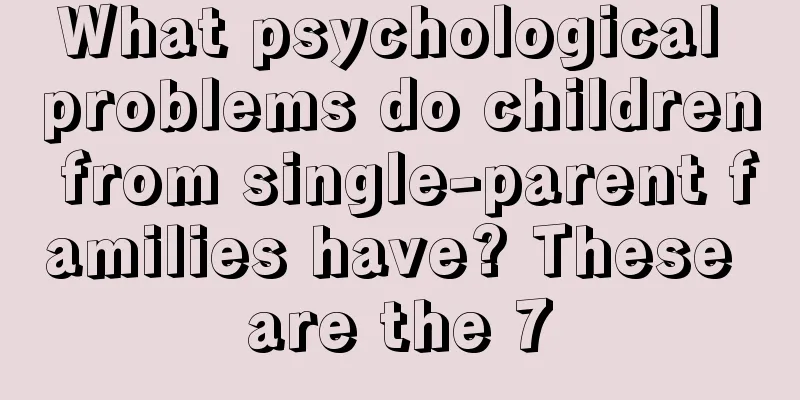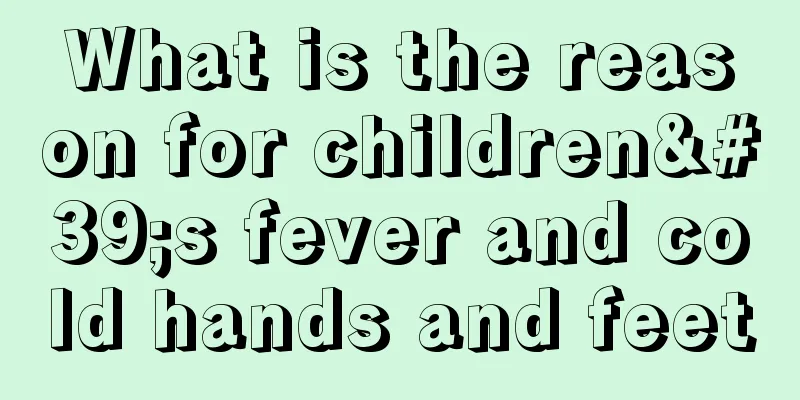What psychological problems do children from single-parent families have? These are the 7

|
The psychological problems of children from single-parent families have always been a key concern for teachers and parents, but most parents do not know what psychological problems children from single-parent families have, which makes parents very blind. In fact, children from single-parent families have seven psychological problems in their daily lives, and anxiety is one of these psychological problems. 1. Anxiety People anxiety is an indicator that investigates the degree of anticipation of difficulties and failures when interacting with others. What children from single-parent families see during their parents' divorce are attacks between people and what they learn are bargaining and mutual hostility. Therefore, they lack confidence in interpersonal interactions. Their guardians suffer from emotional disorders due to the lack of family, and are likely to bring such emotions into their interactions with their children. The children live in fear and have to spend a lot of time dealing with family relationships after the breakdown of the family. They feel anxious about interpersonal interactions and lack a sense of security. Therefore, they feel uneasy and sensitive in front of others. When making friends, they are always afraid that others will say bad things about them. They are always unhappy when others say something about them. They are withdrawn and anxious in interpersonal relationships. 2. Low self-esteem Having always lived in a complete family, when faced with the sudden breakup of the family, the children are unable to accept the reality and are unable to adapt to an environment without a father or a mother. The child's psychology is not mature. He cannot understand his parents' life or their difficulties. His young mind is fragile and sensitive and he has no ability to adjust himself. Once he is shocked, he will be at a loss and don't know what to do. Children are most likely to think of their past lives when they see their peers playing and frolicking with their parents affectionately and happily. But now is different from the past. The sadness and loss in their hearts make them depressed and inferior. Children cannot find their own happiness and do not see where their happiness is. So they refuse happiness and immerse themselves in worry and sadness. At the same time, children are most sensitive at this time. When faced with the care of their peers and society, they will care too much and even misunderstand. Over time, they will separate themselves from the crowd and enter a self-enclosed and lonely space, which will lead to great obstacles to personality communication. In the long run, they will develop mental illness. 3. Self-blame Self-blame manifests itself as a low assessment of personal abilities and qualities, leading to self-blame, self-contempt, and self-scorn, attributing all misfortunes to one's own shortcomings, and a tendency to fear what one has done. Children from single-parent families have a stronger sense of inferiority. They feel that they are inferior to others and are pessimistic and disappointed. Because they have a low opinion of themselves, they attribute their failures at work and in study to their own incompetence, which causes them to experience negative emotions such as anxiety, guilt, and disappointment, which in turn leads to an overall psychological imbalance. Over time, they lose confidence in themselves, and even tend to give up easily because of their self-pity, even on tasks that can be completed with a little effort. Many children from single-parent families always think it is their fault when they are criticized, and think they have done something wrong when others laugh at them. 4. Depression Because the separation of parents will inevitably bring about family conflict or cold war, children live in a repressive space for a long time, worrying about their parents' relationship all the time. In some families, children even become punching bags for their parents to vent their anger. Children are in fear and worry all day long, have no sense of security, and are always worried and afraid that a family war will break out, which will leave them exhausted. Such long-term life torture can easily cause children to develop fear and hostility, always keep a distance from their peers, have an excessive sense of self-protection, and be very hostile. Children from single-parent families often feel depressed, melancholy, and irritable, and have no way to relieve their psychological distress. Because it has been suppressed for too long, once it explodes, the energy will be greater, making it very easy to lead to extreme behavior. This tendency may manifest itself in girls as wanting to cry or run away from home, and in some boys as aggressive behavior. 5. Jealousy Children from single-parent families generally do not enjoy as much as children from healthy families, both materially and spiritually, and this is exactly what every child desires. Since children from healthy families can get what children from single-parent families can't easily get, their psychology can easily evolve from initial envy to jealousy and hatred. Psychologically, they will show special attachment to one parent, hoping to get double return from that parent. In terms of material enjoyment, if they cannot treat this gap correctly and think that what others can get, they should be able to have it too, it will easily lead to criminal acts such as theft. 6. Rebellion Because children from single-parent families do not have a high status in the "circle of children", they are easily ridiculed and bullied by other children. However, they also desire to be respected and appreciated by others, so they deliberately behave differently in words and deeds, and sometimes even like to "butt heads and go against others" to show the value of their existence. 7. Autism The breakdown of a family is like a "disaster from the sky". For young children, they lack the necessary psychological preparation, so they suffer a greater blow than their parents. Moreover, children are more sensitive and fragile than adults. They do not have the ability to adjust themselves psychologically and find it difficult to face the harsh reality of a broken family. As a result, they feel at a loss and unhappy. Children also know how to compare. They will compare their present with the past and feel that their situation is not as good as before. They will compare themselves with children from healthy families and feel that they are not as good as other children. As a result, they develop an inferiority complex, become timid in doing things, lack self-confidence, lack the enterprising and positive spirit, and feel that they are not as good as other children. These children become depressed due to being alienated by their parents. They are unwilling to interact with others and are often wary and annoyed with people around them, showing symptoms of neurosis. They always suspect that others are talking about their family deficiencies and their parents' divorce behind their backs. They believe that others look down on them and are unwilling to open their hearts to others. As a result, they become self-enclosed, unwilling to go out or interact with others, and display lonely and introverted personality traits. |
<<: Do you know why babies have Mongolian spots?
>>: How to educate boys from single-parent families? 5 things parents should know
Recommend
Children's hands and feet are cold and they are afraid of cold but not fever
Children in their early childhood are very prone ...
How to treat chronic rhinitis in children?
When rhinitis and chronic pharyngitis occur in ou...
How tall is a 10-year-old child?
Children's growth and development is a very s...
How to treat children with ADHD?
ADHD is a common childhood disease, and patients ...
Reasons why babies keep waking up at night
Does your baby always wake up at night? Nowadays,...
What are the benefits of naps for children?
At present, many children have not formed the hab...
Why does my baby poop green after eating milk powder?
For babies, breast milk is the most natural and n...
Baby vomits severely after vaccination
For infants and young children, vaccination is a ...
What is the most suitable temperature for babies to drink water?
After the baby is born, many mothers are in a pan...
How to teach math to kids
Parents always hope that their children can learn...
Why doesn't the baby blink?
Under normal circumstances, people will blink at ...
Baby's cold clear nasal discharge turns yellow
The most distressing thing for a family is when t...
What are the medicines for clearing heat and purging fire in children?
I believe that everyone has some common household...
Why are children so stupid?
I believe that every parent hopes that their chil...
What to do if a three-year-old child has a partial eclipse
It is very common for parents with children at ho...









